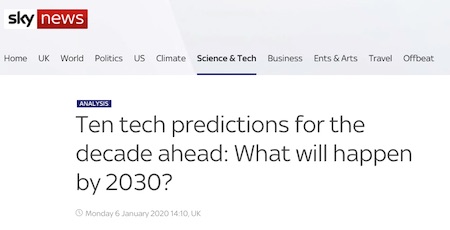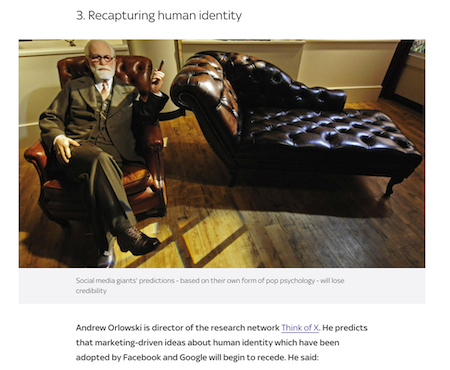
Feature in the Sunday Telegraph, 25 April 2020. A sceptical piece explaining why the technology would fail to meet expectations. The project was scaled back in June. Read more.
New Thinking For A New Era

As one of ten technology predictions for the 2020s at Sky News, Think of X research director Andrew Orlowski points out the flaws of behaviourism as a guiding principle for psychology and politics:
The public keeps delivering up shocks to our experts, who now seem to live in a perpetual state of surprise.
And for that you can blame the pop psychologist Malcolm Gladwell, the bestselling Canadian and the master of the quirky counter-intuitive pop science McNugget.
Following his success, psychologists and neuroscientists began crafting their work to appeal to this new audience.
Both wanted to make their accounts of how we behave to be ‘scientific’ – but their programs had fatal flaws. Psychologists became convinced that we were always wrong, and neuroscientists with extinguishing the idea of free will.
Instead of being complex Enlightenment-era individuals, we were really either rats, or badly flawed robots.
These ideas spread from marketing to our intelligentsia and captivated our policy makers.

So we’ve been nudged and “game-ified” in encounters where the manipulator hopes we don’t notice the manipulation.
Google and Facebook promised the increasingly out-of-touch political class that they could not only understand our behaviour, but shape it too.
“But the result was that by erasing what makes us human, the boffins had painted all the walls white and now couldn’t find the door.
“The explanations were useless. When everything was quirky and counter-intuitive, no intuition could be understood or predicted.
“It doesn’t help that both fields are now beset by crises: what is useful is not reproducible, and what’s reproducible is not useful.
“So my bet is that these fads have had their day. The ‘why we do things’ – the acknowledgement of human agency – will return to explanations of ‘what we do’. It must, for who wants to be surprised all the time?
Google and Facebook promised the increasingly out-of-touch political class that they could not only understand our behaviour, but shape it too.
But the result was that by erasing what makes us human, the boffins had painted all the walls white and now couldn’t find the door.
The explanations were useless. When everything was quirky and counter-intuitive, no intuition could be understood or predicted.
It doesn’t help that both fields are now beset by crises: what is useful is not reproducible, and what’s reproducible is not useful.
So my bet is that these fads have had their day. The ‘why we do things’ – the acknowledgement of human agency – will return to explanations of ‘what we do’. It must, for who wants to be surprised all the time?
Column in The Sunday Telegraph. Contains personal observations from 2003 when Google discovered money – and how Utopianism evolved into indiscriminate data collection.
Quoted in The Sunday Business Post, 1 December 2019 [subscription]:
“Another buzzword that has its roots in New Age thinking. Business gurus sold IT as personal psychological development: ‘transform thyself, transform they business'”